INVESTING IN OUR MEMBERS
INVESTING IN OUR MEMBERS
INVESTING IN OUR MEMBERS
Building the future of the specialty amidst a new normal to dynamically meet member needs
Building the future of the specialty amidst a new normal to dynamically meet member needs
Building the future of the specialty amidst a new normal to dynamically meet member needs
CAP Pivots and Innovates to Meet Evolving Member Needs
The new normal of the pandemic forced the CAP to evolve and meet member needs in dynamic ways. In 2021, the CAP held its first-ever hybrid annual meeting, offering both in-person and virtual experiences for members. While the pandemic lingered throughout the country, the Board of Governors recognized that a large portion of the membership wanted to connect with colleagues face-to-face. More than 1,400 members participated in the hybrid event, which included the inauguration and celebration of CAP President Emily Volk, MD, FCAP.
The CAP launched its very first mobile app at CAP21. The MyCAP app was designed exclusively for members using Apple and Android technologies, with the goal of providing improved access to CAP content and resources. Features in the initial launch include podcasts, pathology case challenges, Cancer Protocols, valued peer content for early-career pathologists, and advocacy alerts and calls to action, as well as a searchable membership directory. The next major release is expected sometime this year.
The MyCAP app, launched in 2021, improves member access to content and resources such as the Cancer Protocols and advocacy alerts when we need to mobilize to protect our patients and the profession.
CAP membership continued to grow in 2021 in all key segments, with over 18,000 total members, and member engagement in committees and councils has been at an all-time high. Also, the CAP launched its first Diversity, Equity, Inclusion Committee to build a more diverse pathology pipeline and maximize the impact of underrepresented pathologists. This new committee reports to the Board of Governors.
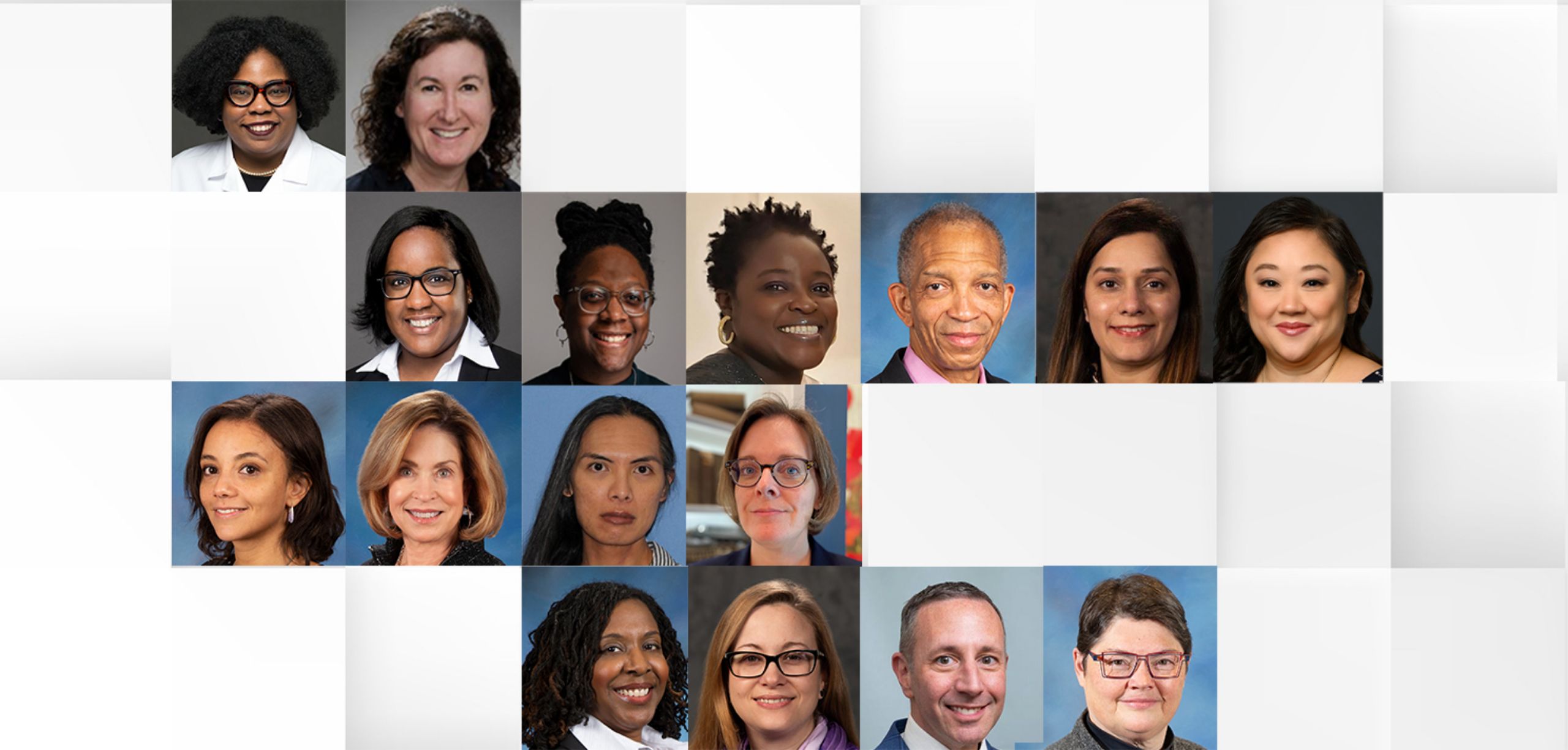
DEI Member Committee, from top left: Valerie A Fitzhugh, MD, FCAP (chair); Suzanne M Dintzis, MD, PhD, FCAP (vice chair); Juanita Emily Ferreira, MD; Brittney Sharrell Graham, DO; Olaronke Akintola-Ogunremi, MD, FCAP; George G Birdsong, MD, FCAP; Aastha Chauhan, MD, FCAP; Jeanie Chiu, MD, FCAP; Juanita J Evans, MD, FCAP; Kathryn T Knight, MD, FCAP; Angela G Lapus, MD, MPH, FCAP; Julie Wilson Lemmon, MD, FCAP; Crystal A Moore, MD, PhD, FCAP, Nicole D Riddle, MD, FCAP; Peter M Sadow, MD, PhD, FCAP; Monica E de Baca, MD, FCAP
Building the future of the specialty also involves ongoing work to increase the number of US medical school seniors and graduates choosing pathology as a specialty. More than 300 medical students enrolled in the CAP’s new Medical Student Forum and over 70 attended CAP21. There are more than 20 designated pathologist champions at US medical schools, with the ultimate goal to have one in every program nationwide.
CAP Pivots and Innovates to Meet Evolving Member Needs
The new normal of the pandemic forced the CAP to evolve and meet member needs in dynamic ways. In 2021, the CAP held its first-ever hybrid annual meeting, offering both in-person and virtual experiences for members. While the pandemic lingered throughout the country, the Board of Governors recognized that a large portion of the membership wanted to connect with colleagues face-to-face. More than 1,400 members participated in the hybrid event, which included the inauguration and celebration of CAP President Emily Volk, MD, FCAP.
The CAP launched its very first mobile app at CAP21. The MyCAP app was designed exclusively for members using Apple and Android technologies, with the goal of providing improved access to CAP content and resources. Features in the initial launch include podcasts, pathology case challenges, Cancer Protocols, valued peer content for early-career pathologists, and advocacy alerts and calls to action, as well as a searchable membership directory. The next major release is expected sometime this year.
The MyCAP app, launched in 2021, improves member access to content and resources such as the Cancer Protocols and advocacy alerts when we need to mobilize to protect our patients and the profession.
CAP membership continued to grow in 2021 in all key segments, with over 18,000 total members, and member engagement in committees and councils has been at an all-time high. Also, the CAP launched its first Diversity, Equity, Inclusion Committee to build a more diverse pathology pipeline and maximize the impact of underrepresented pathologists. This new committee reports to the Board of Governors.
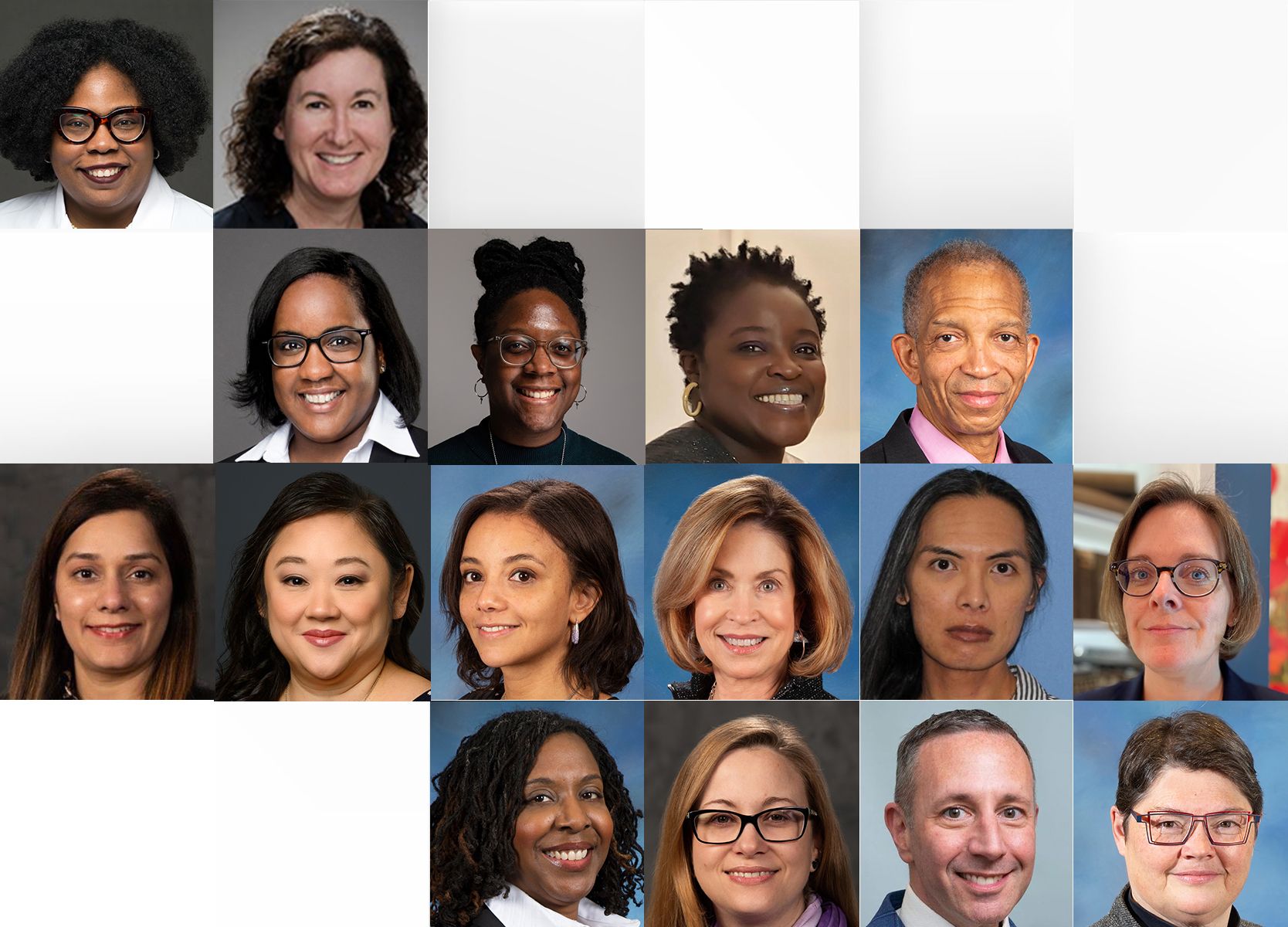
DEI Member Committee, from top left: Valerie A Fitzhugh, MD, FCAP (chair); Suzanne M Dintzis, MD, PhD, FCAP (vice chair); Juanita Emily Ferreira, MD; Brittney Sharrell Graham, DO; Olaronke Akintola-Ogunremi, MD, FCAP; George G Birdsong, MD, FCAP; Aastha Chauhan, MD, FCAP; Jeanie Chiu, MD, FCAP; Juanita J Evans, MD, FCAP; Kathryn T Knight, MD, FCAP; Angela G Lapus, MD, MPH, FCAP; Julie Wilson Lemmon, MD, FCAP; Crystal A Moore, MD, PhD, FCAP, Nicole D Riddle, MD, FCAP; Peter M Sadow, MD, PhD, FCAP; Monica E de Baca, MD, FCAP
Building the future of the specialty also involves ongoing work to increase the number of US medical school seniors and graduates choosing pathology as a specialty. More than 300 medical students enrolled in the CAP’s new Medical Student Forum and over 70 attended CAP21. There are more than 20 designated pathologist champions at US medical schools, with the ultimate goal to have one in every program nationwide.
CAP Pivots and Innovates to Meet Evolving Member Needs
The new normal of the pandemic forced the CAP to evolve and meet member needs in dynamic ways. In 2021, the CAP held its first-ever hybrid annual meeting, offering both in-person and virtual experiences for members.
While the pandemic lingered throughout the country, the Board of Governors recognized that a large portion of the membership wanted to connect with colleagues face-to-face. More than 1,400 members participated in the hybrid event, which included the inauguration and celebration of CAP President Emily Volk, MD, FCAP.
The CAP launched its very first mobile app at CAP21. The MyCAP app was designed exclusively for members using Apple and Android technologies, with the goal of providing improved access to CAP content and resources. Features in the initial launch include podcasts, pathology case challenges, Cancer Protocols, valued peer content for early-career pathologists, and advocacy alerts and calls to action, as well as a searchable membership directory. The next major release is expected sometime this year.
The MyCAP app, launched in 2021, improves member access to content and resources such as the Cancer Protocols and advocacy alerts when we need to mobilize to protect our patients and the profession.
CAP membership continued to grow in 2021 in all key segments, with over 18,000 total members, and member engagement in committees and councils has been at an all-time high. Also, the CAP launched its first Diversity, Equity, Inclusion Committee to build a more diverse pathology pipeline and maximize the impact of underrepresented pathologists. This new committee reports to the Board of Governors.

DEI Member Committee, from top left: Valerie A Fitzhugh, MD, FCAP (chair); Suzanne M Dintzis, MD, PhD, FCAP (vice chair); Juanita Emily Ferreira, MD; Brittney Sharrell Graham, DO; Olaronke Akintola-Ogunremi, MD, FCAP; George G Birdsong, MD, FCAP; Aastha Chauhan, MD, FCAP; Jeanie Chiu, MD, FCAP; Juanita J Evans, MD, FCAP; Kathryn T Knight, MD, FCAP; Angela G Lapus, MD, MPH, FCAP; Julie Wilson Lemmon, MD, FCAP; Crystal A Moore, MD, PhD, FCAP, Nicole D Riddle, MD, FCAP; Peter M Sadow, MD, PhD, FCAP; Monica E de Baca, MD, FCAP
Building the future of the specialty also involves ongoing work to increase the number of US medical school seniors and graduates choosing pathology as a specialty. More than 300 medical students enrolled in the CAP’s new Medical Student Forum and over 70 attended CAP21. There are more than 20 designated pathologist champions at US medical schools, with the ultimate goal to have one in every program nationwide.
Education Prepares Members for Successful Careers
In an evolving health care landscape, pathologists need the knowledge, relationships, and expertise to navigate change, enhance their careers, and sustain the specialty. The CAP21 hybrid meeting offered excellent opportunities for members to explore the latest in emerging science, improve their laboratory and practice management skills, and advocate for pathology. The in-person meeting at the Hyatt Regency Chicago offered 55 education courses; in-person and virtual participants also had access to 66 virtual courses, including those that were live-streamed. Whether in person or virtual, participants rated the overall value of the education courses and faculty effectiveness very highly.
The CAP continues to expand and enhance its education offerings to better meet members’ needs. The organization launched several new programs, including a new online inspector training program redesigned in an adaptive learning format that customizes content based on individual learners’ needs, a live virtual multidisciplinary breast pathology workshop, a new online informatics case-based education program, and eight new online offerings in GI, GU, and GYN. In addition, the CAP continued to release new courses in ongoing online education programs, including Virtual Biopsy Program, Clinical Pathology Improvement Program, Variant Interpretation Program, and glass slide programs (ie, PAP, PIP, and NGC).
Education Prepares Members for Successful Careers
In an evolving health care landscape, pathologists need the knowledge, relationships, and expertise to navigate change, enhance their careers, and sustain the specialty. The CAP21 hybrid meeting offered excellent opportunities for members to explore the latest in emerging science, improve their laboratory and practice management skills, and advocate for pathology. The in-person meeting at the Hyatt Regency Chicago offered 55 education courses; in-person and virtual participants also had access to 66 virtual courses, including those that were live-streamed. Whether in person or virtual, participants rated the overall value of the education courses and faculty effectiveness very highly.
The CAP continues to expand and enhance its education offerings to better meet members’ needs. The organization launched several new programs, including a new online inspector training program redesigned in an adaptive learning format that customizes content based on individual learners’ needs, a live virtual multidisciplinary breast pathology workshop, a new online informatics case-based education program, and eight new online offerings in GI, GU, and GYN. In addition, the CAP continued to release new courses in ongoing online education programs, including Virtual Biopsy Program, Clinical Pathology Improvement Program, Variant Interpretation Program, and glass slide programs (ie, PAP, PIP, and NGC).
Education Prepares Members for Successful Careers
In an evolving health care landscape, pathologists need the knowledge, relationships, and expertise to navigate change, enhance their careers, and sustain the specialty.
The CAP21 hybrid meeting offered excellent opportunities for members to explore the latest in emerging science, improve their laboratory and practice management skills, and advocate for pathology. The in-person meeting at the Hyatt Regency Chicago offered 55 education courses; in-person and virtual participants also had access to 66 virtual courses, including those that were live-streamed. Whether in person or virtual, participants rated the overall value of the education courses and faculty effectiveness very highly.
The CAP continues to expand and enhance its education offerings to better meet members’ needs. The organization launched several new programs, including a new online inspector training program redesigned in an adaptive learning format that customizes content based on individual learners’ needs, a live virtual multidisciplinary breast pathology workshop, a new online informatics case-based education program, and eight new online offerings in GI, GU, and GYN. In addition, the CAP continued to release new courses in ongoing online education programs, including Virtual Biopsy Program, Clinical Pathology Improvement Program, Variant Interpretation Program, and glass slide programs (ie, PAP, PIP, and NGC).
KNOWLEDGE-SHARING SUCCESSES
573
live and online educational courses offered to pathologists and laboratory professionals
>64,000
CME activities completed by physicians
93%
of CME courses rated as a 4.2 or greater on a 5.0 scale in overall value by participants
32
scientific committees, comprising 560 member experts, that met regularly to pioneer and update CAP programs
~1,000
committee positions filled by CAP members serving to promote advocacy, learning, laboratory improvement, and professional development
1,439
professionals who attended CAP21, the CAP’s annual meeting, with pathologists accessing more than 90 CME courses
14,000
pathologists who received our peer-reviewed journal, Archives of Pathology & Laboratory Medicine
41,000
professionals who subscribed to our monthly trade publication, CAP Today
KNOWLEDGE-SHARING SUCCESSES
573
live and online educational courses offered to pathologists and laboratory professionals
>64,000
CME activities completed by physicians
93%
of CME courses rated as a 4.2 or greater on a 5.0 scale in overall value by participants
32
scientific committees, comprising 560 member experts, that met regularly to pioneer and update CAP programs
~1,000
committee positions filled by CAP members serving to promote advocacy, learning, laboratory improvement, and professional development
1,439
professionals who attended CAP21, the CAP’s annual meeting, with pathologists accessing more than 90 CME courses
14,000
pathologists who received our peer-reviewed journal, Archives of Pathology & Laboratory Medicine
41,000
professionals who subscribed to our monthly trade publication, CAP Today
KNOWLEDGE-SHARING SUCCESSES
573
live and online educational courses offered to pathologists and laboratory professionals
>64,000
CME activities completed by physicians
93%
of CME courses rated as a 4.2 or greater on a 5.0 scale in overall value by participants
32
scientific committees, comprising 560 member experts, that met regularly to pioneer and update CAP programs
~1,000
committee positions filled by CAP members serving to promote advocacy, learning, laboratory improvement, and professional development
1,439
professionals who attended CAP21, the CAP’s annual meeting, with pathologists accessing more than 90 CME courses
14,000
pathologists who received our peer-reviewed journal, Archives of Pathology & Laboratory Medicine
41,000
professionals who subscribed to our monthly trade publication, CAP Today
Residents Forum Shapes Future Pathology Leaders
CAP junior membership provides valuable resources to help pathologists in training become the leaders of tomorrow. Pathology residents are faced with many life-changing and often stressful decisions impacting themselves, their families, and patients. This requires them to be leaders in the laboratory, hospital, and specialty.
Through the Residents Forum, the CAP provides opportunities to develop and demonstrate valuable leadership skills that trainees can use in every facet of their career. Becoming a member of the Residents Forum Executive Committee fosters the development of non-clinical skills, which are often missing from residency training. This empowers them to lead and advocate for the specialty.
Residents Forum Shapes Future Pathology Leaders
CAP junior membership provides valuable resources to help pathologists in training become the leaders of tomorrow. Pathology residents are faced with many life-changing and often stressful decisions impacting themselves, their families, and patients. This requires them to be leaders in the laboratory, hospital, and specialty.
Through the Residents Forum, the CAP provides opportunities to develop and demonstrate valuable leadership skills that trainees can use in every facet of their career. Becoming a member of the Residents Forum Executive Committee fosters the development of non-clinical skills, which are often missing from residency training. This empowers them to lead and advocate for the specialty.
Residents Forum Shapes Future Pathology Leaders
CAP junior membership provides valuable resources to help pathologists in training become the leaders of tomorrow.
Pathology residents are faced with many life-changing and often stressful decisions impacting themselves, their families, and patients. This requires them to be leaders in the laboratory, hospital, and specialty.
Through the Residents Forum, the CAP provides opportunities to develop and demonstrate valuable leadership skills that trainees can use in every facet of their career. Becoming a member of the Residents Forum Executive Committee fosters the development of non-clinical skills, which are often missing from residency training. This empowers them to lead and advocate for the specialty.
House of Delegates Fosters Influence and Connection
The House of Delegates (HOD) is the largest body of elected members within the CAP, with 500 members in 57 delegations throughout the United States, Canada, and in the Armed Forces. The HOD represents the diversity that is the CAP and is a home for leadership development and engagement, where CAP members connect with pathology colleagues and influencers on key issues impacting the specialty. HOD meetings provide members an opportunity to learn the latest on critical topics, share knowledge with colleagues from across the country, provide input and feedback to CAP leadership, and connect with their peers.
Following a very successful live streamed virtual spring HOD meeting, the first live streamed hybrid fall HOD meeting at CAP21 received record high satisfaction scores and featured top-rated sessions, including panel discussions on augmented/artificial intelligence and digital pathology as well as advocacy updates, which included a 21st Century Cures Act discussion. These sessions, among others, accomplished the HOD goal of providing timely, practice-impacting information to all members in an interactive fashion, with input from HOD members and direct dialogue with CAP leadership.
In 2021, House members were routinely tapped to support critical policy and regulatory efforts. In addition, delegate input on Cancer Protocols and Test Ordering Modules shaped the development of these products and services. Among other efforts, a new HOD Communications Network is poised for introduction in 2022, with plans to connect our delegations and their state CAP colleagues directly with leadership by utilizing delegation chairs as the informational hub.
House of Delegates Fosters Influence and Connection
The House of Delegates (HOD) is the largest body of elected members within the CAP, with 500 members in 57 delegations throughout the United States, Canada, and in the Armed Forces. The HOD represents the diversity that is the CAP and is a home for leadership development and engagement, where CAP members connect with pathology colleagues and influencers on key issues impacting the specialty. HOD meetings provide members an opportunity to learn the latest on critical topics, share knowledge with colleagues from across the country, provide input and feedback to CAP leadership, and connect with their peers.
Following a very successful live streamed virtual spring HOD meeting, the first live streamed hybrid fall HOD meeting at CAP21 received record high satisfaction scores and featured top-rated sessions, including panel discussions on augmented/artificial intelligence and digital pathology as well as advocacy updates, which included a 21st Century Cures Act discussion. These sessions, among others, accomplished the HOD goal of providing timely, practice-impacting information to all members in an interactive fashion, with input from HOD members and direct dialogue with CAP leadership.
In 2021, House members were routinely tapped to support critical policy and regulatory efforts. In addition, delegate input on Cancer Protocols and Test Ordering Modules shaped the development of these products and services. Among other efforts, a new HOD Communications Network is poised for introduction in 2022, with plans to connect our delegations and their state CAP colleagues directly with leadership by utilizing delegation chairs as the informational hub.
House of Delegates Fosters Influence and Connection
The House of Delegates (HOD) is the largest body of elected members within the CAP, with 500 members in 57 delegations throughout the United States, Canada, and in the Armed Forces.
The HOD represents the diversity that is the CAP and is a home for leadership development and engagement, where CAP members connect with pathology colleagues and influencers on key issues impacting the specialty. HOD meetings provide members an opportunity to learn the latest on critical topics, share knowledge with colleagues from across the country, provide input and feedback to CAP leadership, and connect with their peers.
Following a very successful live streamed virtual spring HOD meeting, the first live streamed hybrid fall HOD meeting at CAP21 received record high satisfaction scores and featured top-rated sessions, including panel discussions on augmented/artificial intelligence and digital pathology as well as advocacy updates, which included a 21st Century Cures Act discussion. These sessions, among others, accomplished the HOD goal of providing timely, practice-impacting information to all members in an interactive fashion, with input from HOD members and direct dialogue with CAP leadership.
In 2021, House members were routinely tapped to support critical policy and regulatory efforts. In addition, delegate input on Cancer Protocols and Test Ordering Modules shaped the development of these products and services. Among other efforts, a new HOD Communications Network is poised for introduction in 2022, with plans to connect our delegations and their state CAP colleagues directly with leadership by utilizing delegation chairs as the informational hub.
Engaged Leadership Academy Empowers Members to Own and Tell Their Stories
The Engaged Leadership Academy (ELA) provides professional development and communications skill-building for members. In 2021, the ELA convened in-person, with 42 members attending after a year’s hiatus of in-person ELA learning. With the passing of the Cures Act, pathologists are interacting with patients now more than ever, and the need for communication skills training is high. ELA attendees ranked the following subjects highly: speaking at tumor board meetings, virtual communications, and how to apply communication strategies to effectively collaborate, influence, and manage resistance from others. Those who attend the ELA are paired in groups with experienced faculty and world-renowned communications leaders to learn how to be most effective in moving pathology forward.
Engaged Leadership Academy Empowers Members to Own and Tell Their Stories
The Engaged Leadership Academy (ELA) provides professional development and communications skill-building for members. In 2021, the ELA convened in-person, with 42 members attending after a year’s hiatus of in-person ELA learning. With the passing of the Cures Act, pathologists are interacting with patients now more than ever, and the need for communication skills training is high. ELA attendees ranked the following subjects highly: speaking at tumor board meetings, virtual communications, and how to apply communication strategies to effectively collaborate, influence, and manage resistance from others. Those who attend the ELA are paired in groups with experienced faculty and world-renowned communications leaders to learn how to be most effective in moving pathology forward.
Engaged Leadership Academy Empowers Members to Own and Tell Their Stories
The Engaged Leadership Academy (ELA) provides professional development and communications skill-building for members. In 2021, the ELA convened in-person, with 42 members attending after a year’s hiatus of in-person ELA learning.
With the passing of the Cures Act, pathologists are interacting with patients now more than ever, and the need for communication skills training is high. ELA attendees ranked the following subjects highly: speaking at tumor board meetings, virtual communications, and how to apply communication strategies to effectively collaborate, influence, and manage resistance from others. Those who attend the ELA are paired in groups with experienced faculty and world-renowned communications leaders to learn how to be most effective in moving pathology forward.
CAP Communicates Expertise through Earned and Paid Media
The CAP continued to be a trusted voice in the ongoing COVID-19 media conversation during 2021. Many CAP members and leaders participated in top-tier media interviews, educating the public on the importance of COVID testing and using the right tests to help curb the virus.
CAP President Patrick Godbey, MD, FCAP, was featured in The New York Times, USA Today, The Wall Street Journal, Associated Press, The Atlanta Journal-Constitution, Popular Science Magazine, CNN Digital, and CNBC. Emily E. Volk, MD, FCAP, who assumed the CAP presidency last September, has appeared on CBS News Radio, CNN, CNN.com, and Sirius XM Radio. Dr. Volk also continued to provide testing education and expertise to reporters from The New York Times, The Wall Street Journal, Associated Press, USA Today, and Laboratory Economics.
The CAP also spoke to the media in support of COVID-19 vaccinations for health care workers and issued a statement against vaccine misinformation. The CAP continued to educate reporters by holding four virtual media briefings discussing important pathology topics, including the latest in breast cancer diagnosis and preparing laboratories against cyber-attacks.
In a paid digital advertising campaign, the CAP addressed the reluctance of some in the Black community to get the COVID vaccine due to an ugly past of clinical experimentation targeting this population. This campaign, featuring Valerie A. Fitzhugh, MD, FCAP, garnered more than 5 million impressions and over 50,000 views of the video. The ads appeared on multiple sites including Newsweek, Us Weekly, and Entrepreneur, and the video played on TV network apps such as ABC, A&E, NBC, and Discovery.
The CAP’s partnership with the American Hospital Association (AHA) creates greater exposure for pathologist’s critical role in health care, reaching 80,000 health care executives through AHA digital channels. The CAP collaborates with AHA to produce podcasts, case examples, and an annual dialogue featuring CAP members in conversation with health care executives. Often the executives are pathologists, too. In 2021, topics included the podcast “8 strategies to help hospital systems manage crises, challenges,” the case example “Effective Clinician/Laboratory Collaboration: Moving Beyond the Usual,” and the published dialogue “The Future of Laboratory Practices: Bringing Value to Hospitals and Health System.” The CAP-AHA partnership continues to bring together leading health systems/hospitals, executives, and pathologists.
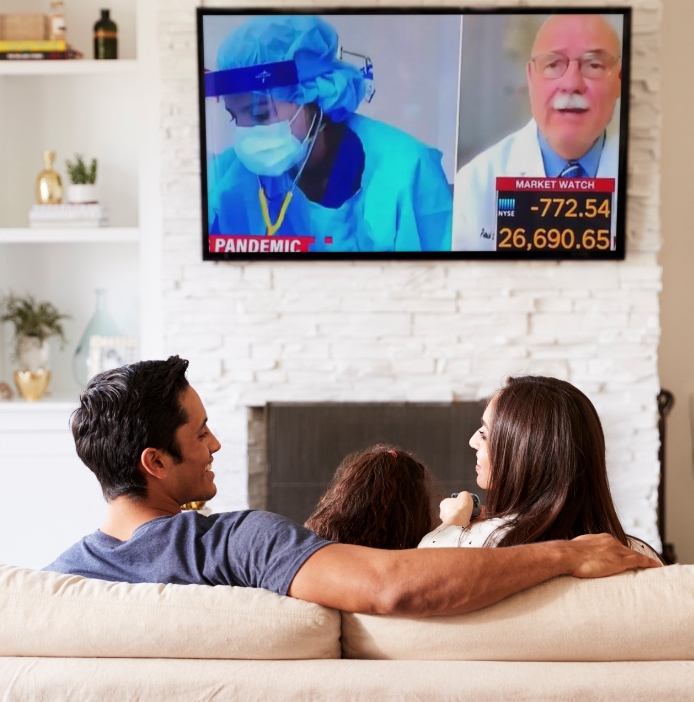
CAP Communicates Expertise through Earned and Paid Media
The CAP continued to be a trusted voice in the ongoing COVID-19 media conversation during 2021. Many CAP members and leaders participated in top-tier media interviews, educating the public on the importance of COVID testing and using the right tests to help curb the virus.
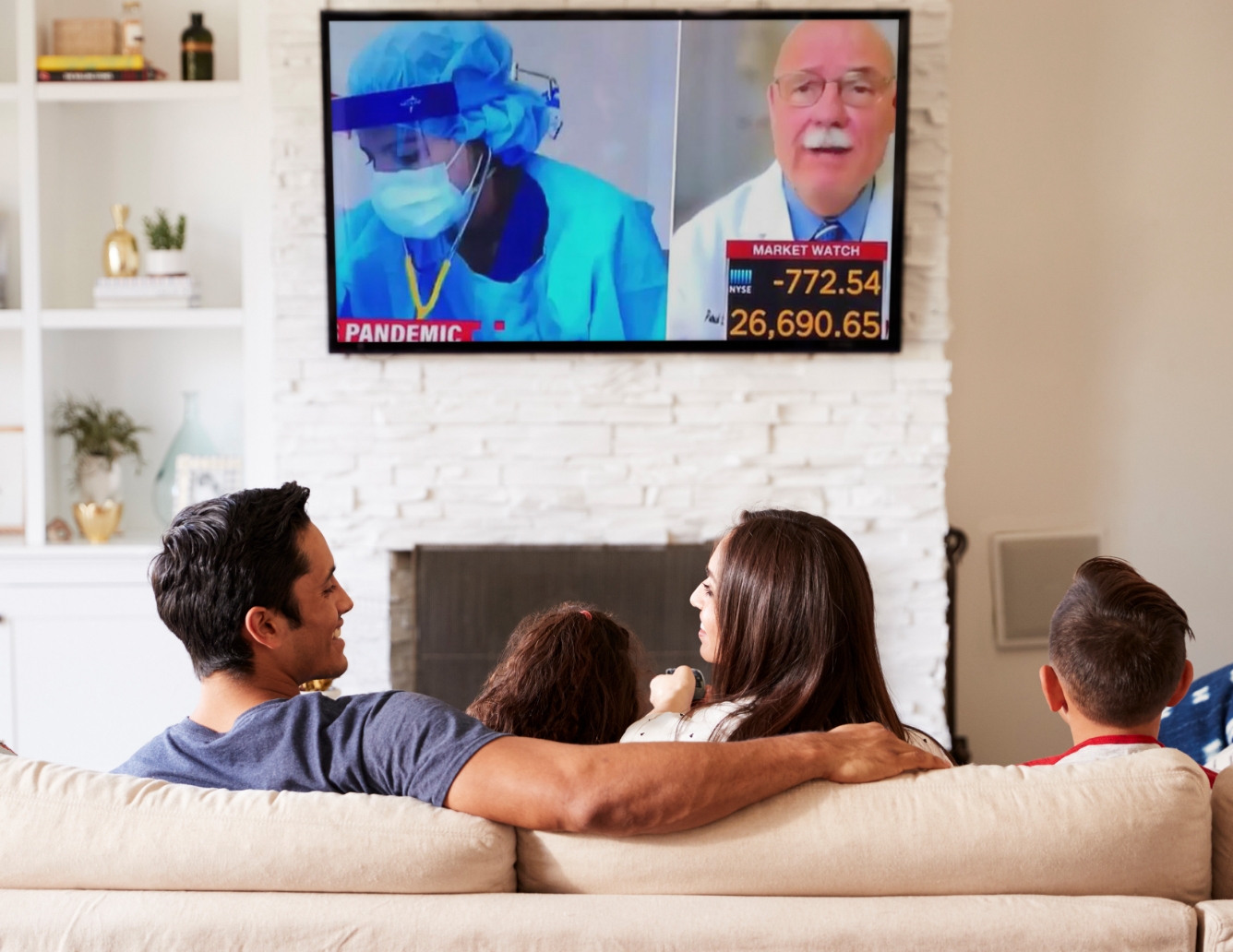
CAP President Patrick Godbey, MD, FCAP, was featured in The New York Times, USA Today, The Wall Street Journal, Associated Press, The Atlanta Journal-Constitution, Popular Science Magazine, CNN Digital, and CNBC. Emily E. Volk, MD, FCAP, who assumed the CAP presidency last September, has appeared on CBS News Radio, CNN, CNN.com, and Sirius XM Radio. Dr. Volk also continued to provide testing education and expertise to reporters from The New York Times, The Wall Street Journal, Associated Press, USA Today, and Laboratory Economics.
The CAP also spoke to the media in support of COVID-19 vaccinations for health care workers and issued a statement against vaccine misinformation. The CAP continued to educate reporters by holding four virtual media briefings discussing important pathology topics, including the latest in breast cancer diagnosis and preparing laboratories against cyber-attacks.
In a paid digital advertising campaign, the CAP addressed the reluctance of some in the Black community to get the COVID vaccine due to an ugly past of clinical experimentation targeting this population. This campaign, featuring Valerie A. Fitzhugh, MD, FCAP, garnered more than 5 million impressions and over 50,000 views of the video. The ads appeared on multiple sites including Newsweek, Us Weekly, and Entrepreneur, and the video played on TV network apps such as ABC, A&E, NBC, and Discovery.
The CAP’s partnership with the American Hospital Association (AHA) creates greater exposure for pathologist’s critical role in health care, reaching 80,000 health care executives through AHA digital channels. The CAP collaborates with AHA to produce podcasts, case examples, and an annual dialogue featuring CAP members in conversation with health care executives. Often the executives are pathologists, too. In 2021, topics included the podcast “8 strategies to help hospital systems manage crises, challenges,” the case example “Effective Clinician/Laboratory Collaboration: Moving Beyond the Usual,” and the published dialogue “The Future of Laboratory Practices: Bringing Value to Hospitals and Health System.” The CAP-AHA partnership continues to bring together leading health systems/hospitals, executives, and pathologists.
CAP Communicates Expertise through Earned and Paid Media
The CAP continued to be a trusted voice in the ongoing COVID-19 media conversation during 2021. Many CAP members and leaders participated in top-tier media interviews, educating the public on the importance of COVID testing and using the right tests to help curb the virus.

CAP President Patrick Godbey, MD, FCAP, was featured in The New York Times, USA Today, The Wall Street Journal, Associated Press, The Atlanta Journal-Constitution, Popular Science Magazine, CNN Digital, and CNBC. Emily E. Volk, MD, FCAP, who assumed the CAP presidency last September, has appeared on CBS News Radio, CNN, CNN.com, and Sirius XM Radio. Dr. Volk also continued to provide testing education and expertise to reporters from The New York Times, The Wall Street Journal, Associated Press, USA Today, and Laboratory Economics.
The CAP also spoke to the media in support of COVID-19 vaccinations for health care workers and issued a statement against vaccine misinformation. The CAP continued to educate reporters by holding four virtual media briefings discussing important pathology topics, including the latest in breast cancer diagnosis and preparing laboratories against cyber-attacks.
In a paid digital advertising campaign, the CAP addressed the reluctance of some in the Black community to get the COVID vaccine due to an ugly past of clinical experimentation targeting this population. This campaign, featuring Valerie A. Fitzhugh, MD, FCAP, garnered more than 5 million impressions and over 50,000 views of the video. The ads appeared on multiple sites including Newsweek, Us Weekly, and Entrepreneur, and the video played on TV network apps such as ABC, A&E, NBC, and Discovery.
The CAP’s partnership with the American Hospital Association (AHA) creates greater exposure for pathologist’s critical role in health care, reaching 80,000 health care executives through AHA digital channels. The CAP collaborates with AHA to produce podcasts, case examples, and an annual dialogue featuring CAP members in conversation with health care executives. Often the executives are pathologists, too. In 2021, topics included the podcast “8 strategies to help hospital systems manage crises, challenges,” the case example “Effective Clinician/Laboratory Collaboration: Moving Beyond the Usual,” and the published dialogue “The Future of Laboratory Practices: Bringing Value to Hospitals and Health System.” The CAP-AHA partnership continues to bring together leading health systems/hospitals, executives, and pathologists.
CAP Foundation Connects Communities to Care and Advances the Future of Pathology
The pandemic fallout impacted medically at-risk communities into 2021, with significant decreases in rates of preventative care like cervical cancer screening. The CAP Foundation was there to connect patients in need to free cervical and breast cancer screening, as well as health education and other services, with its pathologist-led See, Test & Treat® program. Partnering with 12 health care institutions across the US, the Foundation provided nearly 700 people with care while empowering underserved patients and raising the visibility of pathologists.
Last year also marked the 10th anniversary of See, Test & Treat as a CAP Foundation program. In that time, hundreds of pathologists, working alongside thousands of clinician partners and volunteers, have served over 7,000 patients at more than 90 events.
While the CAP Foundation celebrated its past achievements, it also continued to look to the future. The specialty of tomorrow rests in the hands of committed medical students and early-career pathologists. To help build the pipeline of pathologist leaders, the CAP Foundation provided 40 awards and grants that allowed pathology residents and medical students to attend CAP events. They learned about the most important issues facing the specialty while growing their networks and professional skills. This included expanding the Foundation’s reach outside the US by connecting 10 international pathologists to unparalleled education through the Global Pathology Education Award—an important first step in giving patients all over the world the expert care only a pathologist can provide.
To guarantee continued impact and growth, the CAP Foundation also embarked on the most ambitious fundraising effort in its history with the Empowering Our Future Campaign. Corporate partners like AstraZeneca, Genentech, and Hologic, as well as hundreds of CAP members and staff, all made this significant goal a reality. The over $2 million raised will help ensure another 10 years of See, Test & Treat programs while furthering the Foundation’s overall work on humanitarian initiatives, leadership development, and global outreach.
CAP Supports Staff During the Pandemic and Builds an Inclusive Workforce
The CAP provided consistent communication and support to its employees as the organization moved into less restricted phases of COVID-19. Remote work agreements were approved for each employee not required to be 100% onsite, allowing us to maintain flexible work arrangements while continuing the same level of productivity and service to members and customers. Since living through a pandemic can create stress for employees and their families, the CAP offered on-demand programs and other resources to support the overall well-being of staff, particularly in the area of mental health.
The CAP continues its commitment to diversity, equity, and inclusion (DE&I) for its employees. The DE&I Advisory Group, comprised of staff from across various departments and levels throughout the organization, developed a DE&I strategy to address hiring, retention, development, and advancement; nurture a workplace of mutual respect and inclusion, where employees can bring their authentic selves to work; and develop a culture that considers DE&I in interactions with CAP members, customers, and the community at large. The Executive Operations Team will guide sustained, long-term implementation of the DE&I strategy.

DE&I Advisory Group, from top left: Nancy Johnson (co-chair), Osvaldo Santiago (co-chair), Mary de Sousa, Jackie Glanton, Greg Gleason, Irene Ortiz Gonzalez, Doletta Hobson, Nathan Jones, Alan Kimrey, Clemmie Lozano, Joe Schramm, Breanne Smilie, Apoorva Stull, and Monique Terrell
CAP Foundation Connects Communities to Care and Advances the Future of Pathology
The pandemic fallout impacted medically at-risk communities into 2021, with significant decreases in rates of preventative care like cervical cancer screening. The CAP Foundation was there to connect patients in need to free cervical and breast cancer screening, as well as health education and other services, with its pathologist-led See, Test & Treat® program. Partnering with 12 health care institutions across the US, the Foundation provided nearly 700 people with care while empowering underserved patients and raising the visibility of pathologists.
Last year also marked the 10th anniversary of See, Test & Treat as a CAP Foundation program. In that time, hundreds of pathologists, working alongside thousands of clinician partners and volunteers, have served over 7,000 patients at more than 90 events.
While the CAP Foundation celebrated its past achievements, it also continued to look to the future. The specialty of tomorrow rests in the hands of committed medical students and early-career pathologists. To help build the pipeline of pathologist leaders, the CAP Foundation provided 40 awards and grants that allowed pathology residents and medical students to attend CAP events. They learned about the most important issues facing the specialty while growing their networks and professional skills. This included expanding the Foundation’s reach outside the US by connecting 10 international pathologists to unparalleled education through the Global Pathology Education Award—an important first step in giving patients all over the world the expert care only a pathologist can provide.
To guarantee continued impact and growth, the CAP Foundation also embarked on the most ambitious fundraising effort in its history with the Empowering Our Future Campaign. Corporate partners like AstraZeneca, Genentech, and Hologic, as well as hundreds of CAP members and staff, all made this significant goal a reality. The over $2 million raised will help ensure another 10 years of See, Test & Treat programs while furthering the Foundation’s overall work on humanitarian initiatives, leadership development, and global outreach.
CAP Foundation Connects Communities to Care and Advances the Future of Pathology
The pandemic fallout impacted medically at-risk communities into 2021, with significant decreases in rates of preventative care like cervical cancer screening.
The CAP Foundation was there to connect patients in need to free cervical and breast cancer screening, as well as health education and other services, with its pathologist-led See, Test & Treat® program. Partnering with 12 health care institutions across the US, the Foundation provided nearly 700 people with care while empowering underserved patients and raising the visibility of pathologists.
Last year also marked the 10th anniversary of See, Test & Treat as a CAP Foundation program. In that time, hundreds of pathologists, working alongside thousands of clinician partners and volunteers, have served over 7,000 patients at more than 90 events.
While the CAP Foundation celebrated its past achievements, it also continued to look to the future. The specialty of tomorrow rests in the hands of committed medical students and early-career pathologists. To help build the pipeline of pathologist leaders, the CAP Foundation provided 40 awards and grants that allowed pathology residents and medical students to attend CAP events. They learned about the most important issues facing the specialty while growing their networks and professional skills. This included expanding the Foundation’s reach outside the US by connecting 10 international pathologists to unparalleled education through the Global Pathology Education Award—an important first step in giving patients all over the world the expert care only a pathologist can provide.
To guarantee continued impact and growth, the CAP Foundation also embarked on the most ambitious fundraising effort in its history with the Empowering Our Future Campaign. Corporate partners like AstraZeneca, Genentech, and Hologic, as well as hundreds of CAP members and staff, all made this significant goal a reality. The over $2 million raised will help ensure another 10 years of See, Test & Treat programs while furthering the Foundation’s overall work on humanitarian initiatives, leadership development, and global outreach.
CAP Supports Staff During the Pandemic and Builds an Inclusive Workforce
The CAP provided consistent communication and support to its employees as the organization moved into less restricted phases of COVID-19. Remote work agreements were approved for each employee not required to be 100% onsite, allowing us to maintain flexible work arrangements while continuing the same level of productivity and service to members and customers. Since living through a pandemic can create stress for employees and their families, the CAP offered on-demand programs and other resources to support the overall well-being of staff, particularly in the area of mental health.
The CAP continues its commitment to diversity, equity, and inclusion (DE&I) for its employees. The DE&I Advisory Group, comprised of staff from across various departments and levels throughout the organization, developed a DE&I strategy to address hiring, retention, development, and advancement; nurture a workplace of mutual respect and inclusion, where employees can bring their authentic selves to work; and develop a culture that considers DE&I in interactions with CAP members, customers, and the community at large. The Executive Operations Team will guide sustained, long-term implementation of the DE&I strategy.
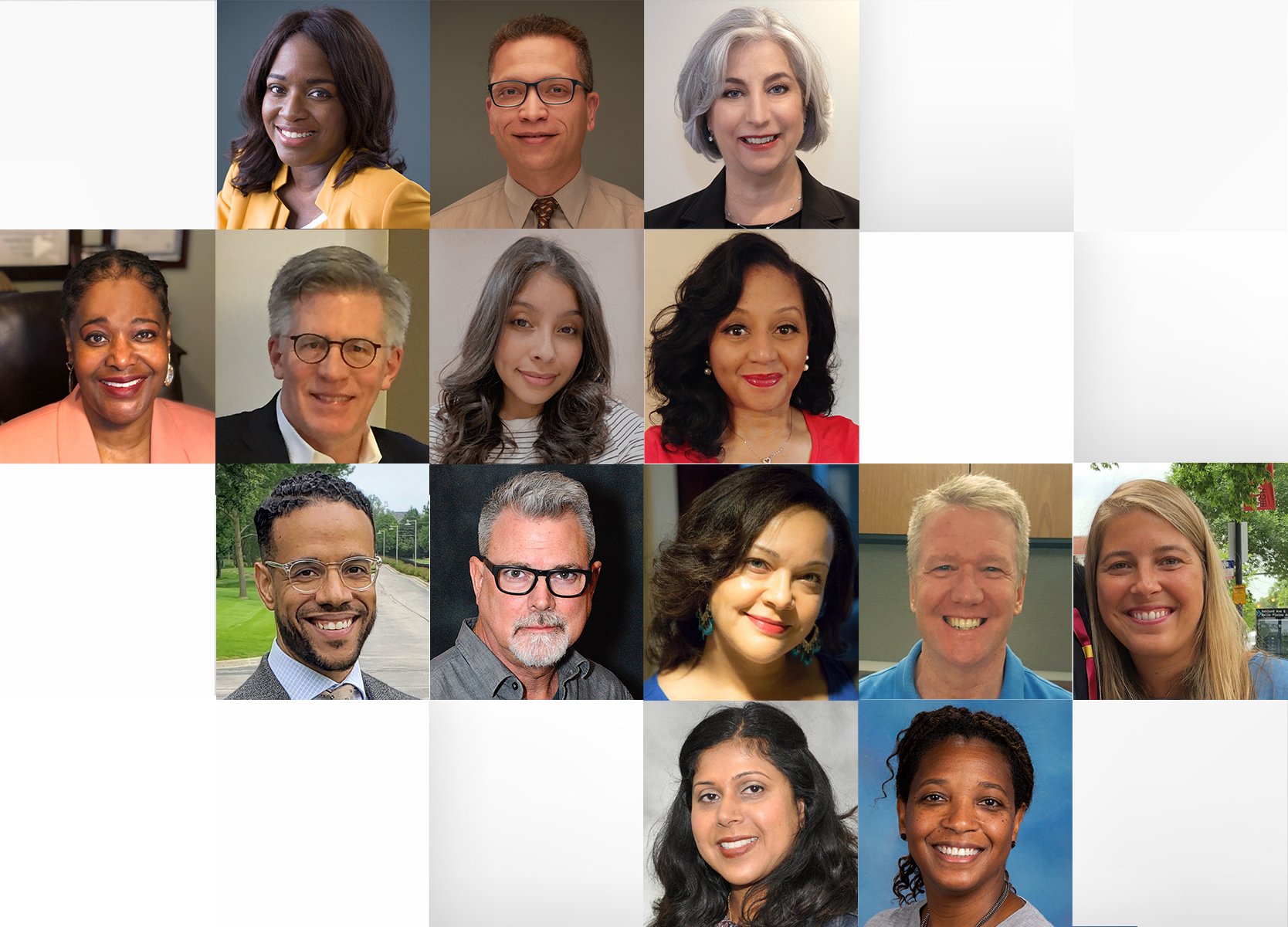
DE&I Advisory Group, from top left: Nancy Johnson (co-chair), Osvaldo Santiago (co-chair), Mary de Sousa, Jackie Glanton, Greg Gleason, Irene Ortiz Gonzalez, Doletta Hobson, Nathan Jones, Alan Kimrey, Clemmie Lozano, Joe Schramm, Breanne Smilie, Apoorva Stull, and Monique Terrell
CAP Supports Staff During the Pandemic and Builds an Inclusive Workforce
The CAP provided consistent communication and support to its employees as the organization moved into less restricted phases of COVID-19.
Remote work agreements were approved for each employee not required to be 100% onsite, allowing us to maintain flexible work arrangements while continuing the same level of productivity and service to members and customers. Since living through a pandemic can create stress for employees and their families, the CAP offered on-demand programs and other resources to support the overall well-being of staff, particularly in the area of mental health.
The CAP continues its commitment to diversity, equity, and inclusion (DE&I) for its employees. The DE&I Advisory Group, comprised of staff from across various departments and levels throughout the organization, developed a DE&I strategy to address hiring, retention, development, and advancement; nurture a workplace of mutual respect and inclusion, where employees can bring their authentic selves to work; and develop a culture that considers DE&I in interactions with CAP members, customers, and the community at large. The Executive Operations Team will guide sustained, long-term implementation of the DE&I strategy.

DE&I Advisory Group, from top left: Nancy Johnson (co-chair), Osvaldo Santiago (co-chair), Mary de Sousa, Jackie Glanton, Greg Gleason, Irene Ortiz Gonzalez, Doletta Hobson, Nathan Jones, Alan Kimrey, Clemmie Lozano, Joe Schramm, Breanne Smilie, Apoorva Stull, and Monique Terrell